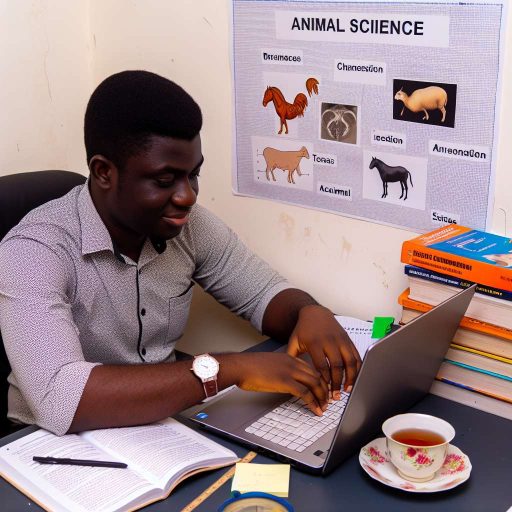Introduction:
A brief overview of the importance of animal science in Nigeria cannot be overstated.
This field is crucial in driving the country’s agricultural sector forward.
Key Subjects in Animal Science Curriculum:
The animal science curriculum in Nigeria covers a wide range of key subjects essential for students in this field.
- Animal Nutrition
- Animal Physiology
- Animal Breeding and Genetics
- Livestock Management
- Animal Product Technology
Importance of Studying Animal Science:
Studying animal science is crucial for Nigeria’s agricultural sector as it ensures sustainable livestock production, food security, and economic growth.
Animal Physiology:
Understanding animal anatomy and physiology is crucial in the field of animal science.
It provides insights into the internal functions and processes of different species,
which is essential for various applications in agriculture and veterinary medicine.
- Importance of understanding anatomical and physiological functions of animals:
- Studying animal physiology helps in gaining knowledge about how different body systems
- work together to sustain life. It also aids in identifying potential health issues
- and designing appropriate management practices.
- Study of digestive, respiratory, and reproductive systems:
- Animal physiology curriculum typically covers in-depth knowledge about the digestive, respiratory,
- and reproductive systems of various animal species. This includes understanding the
- anatomy, functions, and interconnections between these systems.
- Contribution of animal physiology to animal health and productivity:
- A sound understanding of animal physiology is fundamental to ensuring animal health
- and enhancing productivity. It helps in diagnosing diseases, designing nutrition
- programs, and improving breeding practices to maximize output.
Animal physiology plays a pivotal role in animal science education in Nigeria by equipping students with the knowledge and skills necessary to promote the well-being and productivity of livestock and companion animals.
Animal Nutrition:
The role of proper nutrition in animal growth and development.
Study of different types of feeds and their importance.
How nutrition impacts the overall health and well-being of animals.
Proper nutrition plays a crucial role in the growth and development of animals.
It provides essential nutrients needed for various physiological functions, including growth, reproduction, and immune system support.
Animals require a balanced diet consisting of proteins, carbohydrates, fats, vitamins, and minerals to thrive.
The study of different types of feeds is essential to ensure that animals receive the necessary nutrients for their well-being.
For example, protein-rich feeds are essential for muscle development and maintenance.
Carbohydrates provide energy for daily activities.
Fats are important for insulation and energy storage.
Vitamins and minerals play vital roles in metabolic processes and overall health.
It is crucial to understand the nutritional requirements of different animal species and tailor their diets accordingly.
For instance, herbivores like cows and sheep require roughage such as grass and hay.
Carnivores like cats and dogs need a diet rich in animal proteins.
Additionally, the quality and quantity of feed given to animals directly impact their health and well-being.
Imbalanced diets can lead to nutrient deficiencies, which may result in stunted growth, poor reproductive performance, and increased susceptibility to diseases.
Nutrition also plays a significant role in preventing and managing various health conditions in animals.
Proper nutrition strengthens the immune system, making animals more resilient to infections and diseases.
Furthermore, nutrition influences the overall productivity and performance of animals, particularly in livestock farming.
Well-nourished animals are more likely to achieve optimal growth rates, reproductive success, and milk or meat production.
Animal nutrition is a fundamental aspect of animal science curriculum in Nigeria.
It provides students with the knowledge and skills necessary to meet the nutritional needs of diverse animal species, ensuring their health, well-being, and productivity.
By understanding the role of nutrition in animal growth and development, students can contribute to the sustainable management of livestock and wildlife populations in Nigeria.
Gain More Insights: Ecology Internships and Volunteer Programs in Nigeria
Animal Breeding and Genetics:
Animal breeding and genetics play a crucial role in shaping the future of livestock production in Nigeria.
Understanding the principles of genetics is essential for improving animal breeds and enhancing productivity.
By focusing on selective breeding techniques and genetic advancements, animal scientists can create a sustainable and profitable industry.
Importance of Genetics in Improving Animal Breeds:
Genetics is the foundation of animal breeding, as it determines the traits passed down from one generation to the next.
By selecting animals with desired genetic traits, breeders can create offspring with improved characteristics, such as higher milk production, faster growth rates, and disease resistance.
This results in a more efficient and productive livestock population.
Selective Breeding Techniques to Enhance Desirable Traits:
Selective breeding involves choosing animals with specific desirable traits to mate and produce offspring with those characteristics.
Through careful selection and controlled breeding, animal scientists can enhance desirable traits, such as increased milk yield, improved meat quality, and better disease resistance.
Transform Your Career with Expert Guidance
Get personalized mentorship consulting that’s tailored to your unique path. Our expert advice is actionable and exclusive.
Get StartedThis process helps to accelerate genetic progress and improve overall herd performance.
Understanding of Inheritance Patterns and Genetic Diseases in Animals:
Understanding inheritance patterns is essential for predicting the likelihood of offspring inheriting certain traits.
By studying genetic diseases and their inheritance, animal scientists can develop strategies to reduce the occurrence of these conditions in livestock populations.
Through genetic testing and breeding protocols, the prevalence of genetic diseases can be minimized, leading to healthier and more resilient animal breeds.
Animal breeding and genetics are key subjects in the animal science curriculum in Nigeria.
By emphasizing the importance of genetics, selective breeding techniques, and the understanding of inheritance patterns and genetic diseases, students can acquire the necessary knowledge and skills to contribute to the sustainable development of the livestock industry in the country.
With a focus on genetic advancements and breeding strategies, Nigeria can enhance its livestock breeds and improve productivity for a more prosperous future.
Explore Further: Environmental Impact Assessments in Nigerian Biology
Animal Health and Diseases:
Importance of disease prevention and control in animal husbandry.
Common diseases in livestock and their management.
Vaccination schedules and biosecurity measures in animal farms.
In animal science curriculum in Nigeria, the subject of animal health and diseases is crucial for the overall well-being of livestock.
Importance of Disease Prevention and Control in Animal Husbandry:
Disease prevention is vital in animal husbandry to maintain the health of livestock and prevent economic losses.
By implementing proper biosecurity measures, farmers can reduce the risk of disease transmission within their farms.
Common Diseases in Livestock and Their Management:
Livestock in Nigeria are susceptible to various diseases such as foot and mouth disease, Newcastle disease, and brucellosis.
It is essential for students to learn about the symptoms, diagnosis, and treatment of these common diseases to effectively manage them in farm settings.
Vaccination Schedules and Biosecurity Measures in Animal Farms:
Vaccination plays a critical role in preventing infectious diseases in livestock.
It is important for students to understand the proper vaccination schedules for different animals and to follow biosecurity measures to prevent the introduction and spread of diseases on the farm.
Gain More Insights: Top Nigerian Universities for Agricultural Science

Livestock Production and Management
Livestock production and management are essential components of the animal science curriculum in Nigeria.
Students are exposed to various techniques and practices aimed at achieving efficiency in managing livestock farms.
Techniques for Efficient Management of Livestock Farms
Students learn about the best practices for managing livestock farms to ensure optimal productivity.
This includes proper feeding schedules, housing design, and disease prevention measures.
Study of Housing, Feeding, and Breeding Practices in Animal Production
In this subject, students delve into the different types of housing structures suitable for various livestock species.
They also study the nutritional requirements of different animals and breeding practices for improved genetics.
Economic Aspects of Animal Farming and Marketing Strategies
Understanding the economic aspects of animal farming is crucial for success in the industry.
Students learn about cost-effective production methods, market analysis, and strategic marketing techniques to maximize profits.
The livestock production and management subject equips students with the knowledge and skills needed to run successful livestock operations in Nigeria.
It prepares them to contribute to the growth and development of the animal agriculture sector in the country.
You Might Also Like: Balancing Applied Math Studies and Personal Life
Animal Husbandry Practices in Nigeria
When it comes to animal science curriculum in Nigeria, one of the key subjects that students study is Animal Husbandry Practices.
This subject covers a wide range of topics related to the care and management of animals in various settings.
Introduction to Different Animal Species and Their Husbandry Practices
Students learn about the characteristics and requirements of different animal species commonly found in Nigeria.
This includes livestock such as cows, goats, and poultry, as well as other animals like rabbits and fish.
They also study the specific husbandry practices that are needed to ensure the health and well-being of each species.
Handling and Welfare of Animals in Farms
Another important aspect of animal husbandry practices is learning how to handle animals properly and ensure their welfare.
Students learn about techniques for safely restraining and handling animals, as well as ways to assess and improve their living conditions on farms.
This includes providing suitable shelter, food, and water, as well as monitoring their health and behavior.
Environmental Impact of Animal Husbandry Practices
Students also study the environmental impact of animal husbandry practices, including issues related to waste management, pollution, and sustainability.
They learn about the ways in which animal agriculture can affect the environment.
Students explore strategies for reducing negative impacts through improved practices and technology.
This includes topics such as efficient resource use, waste recycling, and conservation of natural habitats.
By understanding the needs of different animal species, learning how to care for them properly, and considering the environmental impact of their practices.
Students can become more responsible and knowledgeable professionals in the field of animal science.
Key Subjects in Animal Science Education
In Nigeria, the key subjects in the animal science curriculum include Animal Nutrition, Genetics, Animal Health, and Production Management.
Proper education and training in animal science are essential for sustainable agriculture in Nigeria.
This education equips students with the knowledge and skills needed to address various challenges in the livestock industry.
By focusing on these key subjects, students can develop a comprehensive understanding of animal science.
This understanding is crucial for the overall growth and development of the agricultural sector in Nigeria.
Additional Resources
The Damaging Conflict Between Animal Scientists and Vets
Olatunde A. Oderinwale – Graduate Research Assistant – North …




